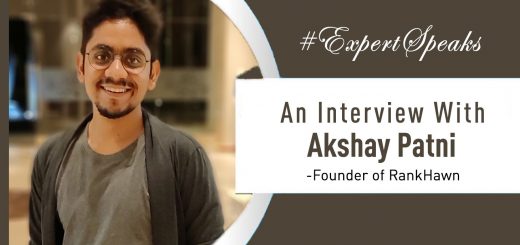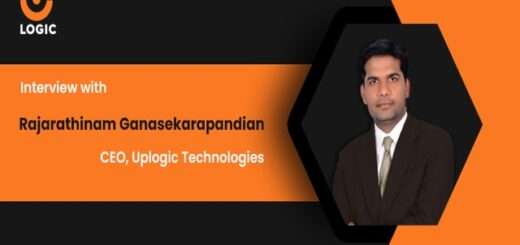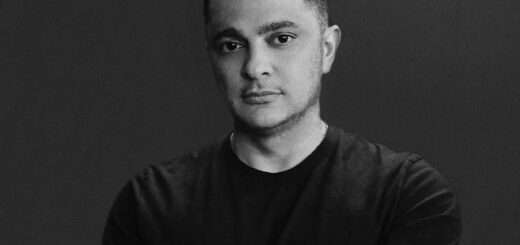Interview with Young Nigerian Entrepreneur, Eze Chijioke
This is an interview with the MD/CEO GooDday Paper Mills Ltd. During this interview, the young Nigerian entrepreneur shared with Next Naija Entrepreneur how he started, some of the challenges he faced, habits that kept him at the top and what he has to say to other young aspiring Nigerian Entrepreneurs about how to start a business. Read on..
PLEASE MAY WE KNOW YOU?
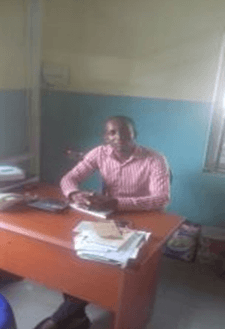
Eze Chijioke
My name is Ezekpudoghu Chijioke. I am 31 years old. I’m from Anambra state. I’m the MD/CEO of GoodDay Paper Mills, a tissue converting company. We have 2 brands of products: GoodDay tissue paper and GoodDay serviette.
HOW DID YOU BECOME AN ENTREPRENEUR?
The beginning was not easy, although nothing comes easy because the world is not a bed of roses. I started GoodDay Paper Mills Ltd in July, 2010. I started with nothing. After my Youth Service in February, 2009, I was able to save only N18,000. I had some money in the stock market because while I was in school I borrowed money from my mother to buy some stocks. When the market crashed my stocks stock became almost useless and I lost a lot of money. But I never wanted to look for a job; in my heart I’m an entrepreneur. At the time, people thought I was crazy. How could someone graduate from school and say he’s not going to look for a job? I mean, why did we send you to school in the first place? (laughs). So when I wanted to start my business, I had no money. But I never believed that I could not get the money. That was my state of mind then; It was not an option for me. I believed strongly that once I was ready, the money would come. The question facing me was: what was I going to do with 18,000? I needed to raise a reasonable sum of money before I could approach anyone for funding. It doesn’t make sense to approach people to fund your business when you have nothing on your own. I knew I could raise money from farming so in 2009, I met my family and friends and told them: “I want to farm. Please I need money”. (Laughs). It was as if I had gone crazy. My people were like: What kind of rubbish is this? Laughs. But I have an amazing sister who always listens to me. I knew I could tell her anything. She encouraged me and gave me 200,000. Now I had some money but there was another problem: land. I went to Awka and met the then Commissioner for Youths and Sports, Mrs Chinwe Anowai. She took me to a director in the Ministry of Agriculture and asked them to make sure I got the land I wanted for my farming enterprise. The director called the people at RTEP (Roots and Tubers Extension Program) at Igbariam. It was a federal government program. Long story short, they leased out 3 hectares of land to me. That solved my problem; I had money and land. Then I used that money to plant maize and cassava.
You did the planting yourself or you hired workers?
Laughs I no strong nah and I had not done any farming in my life. I hired laborers of course.
So in your experience, you started farming without any prior experience?
Yes. It’s possible. I never had any experience; I was a complete novice. I thought that farming was just to plant. That experience taught me that farming is science.
Ok, go on
After the planting season, when I harvested my produce, I didn’t make much profit but I didn’t lose money either. At the end of the day, I got my money back. Farming is not easy; you need knowledge. There were obstacles: The site in Igbariam was not easily accessible and planting was done during the rainy season. So it made cultivation and transportation a nightmare. I also had to deal with middle men while selling my product. Some of them tried to rip me off. So I suspended farming for a while. When I made up my mind to suspend farming, I sold off my hectare of land to a friend and with the money, I thought of what next to do. I had options to go into polythene production or paper mills. I settled on paper mills. I sold off my stocks and with a little support from my family, I entered a partnership deal with my cousin. And that was how GoodDay Paper Mills Ltd came about.
LOOKING AT HOW AND WHEN YOU STARTED, HOW MUCH HAVE YOU GROWN?
Our growth has been exponential. We had our challenges but we have grown. We started with a team of 4 young ladies O-level graduates. I was 25 then. It was a very young team; very naive. We knew basically nothing about tissue production. But my team believed in me and I believed in myself. So we took off. We started with 1 locally fabricated machine that always broke down unexpectedly. We had no generator so we depended solely on NEPA. We once went a whole month without electricity and had to close down production as a result. It was very challenging. But I thank God, we were able to break even in our first year. That was when our product was accepted into the market. By June the following year, we were battling to meet demands. Business has grown exponentially. Now we have up to 70 staff on our payroll.
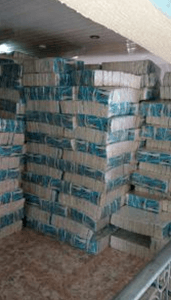
GoodDay Serviette

GoodDay Tissue
WHAT WERE YOUR MAJOR CHALLENGES AND WHAT DID YOU DO TO OVERCOME THEM?
Our challenges were much. We started business at a time when Nigeria was labelled as one of the worst places to start a business in the world. For example, registering a business name should not take more than 24 hours but in Nigeria it could take up to 1 month at times. We dealt with all that. Access to loan facility could take up to a year. In organized countries, it should not take more than a month because time is money.
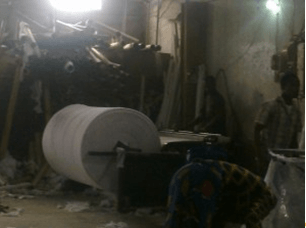
Our First Machine
Our major challenge was electricity. At times we would not get up to 4 hours of electricity in a day. But because power always came on at night, we introduced night shifts. My team was exceptional. Night shifts! And none of them said a word. We worked with locally fabricated machines and they always broke down. You could have electricity but the machines would adamantly refuse to work.
My staff were basically inexperienced. They could neglect things that could cause a lot of damage. But I’m going to hand it to them; they were committed. These were women who would work till late into the night and never complained or demanded overtime. And they did it with all their heart. Their commitment was 100 percent plus one. They were young and naive but their loyalty was more important to me than their work rate because work rate could be improved but loyalty could never be forced.
SO HOW DID YOU KEEP THEM MOTIVATED TO PERFORM AT THEIR PEAK?
Laughs mathematics. Just mathematics. At first it was difficult because none of us had worked for anyone before. We were just fresh out of school; the cohesion was not there at first. But we knew what we were there for. And because I was young, I could relate with them and they liked that. That helped us to form a strong bond. But I still needed to do something about their productivity. See eh to sit down at a place for hours and manually wrap up tissues by hand is never easy. The labor is back breaking. I tried it once and I went home and said to my mother, “I want to quit (laughs). My entire back is aching. This is not what I bargained for.” But I persevered and so did my team. I introduced targets to wrap 20 bags of tissue each. Our general target to break even was to wrap 100 bags of tissue daily. Now there were 5 of us, but 2 of us were handling machines so it was down to 3 of them to wrap 33 bags each if we were to get something out of it. I told them to start with 20 first. At the end of the day, one of them could be doing 4 or 5 (laughs). It happened for weeks and that was not acceptable. So I called them one day and was able to show them that wrapping 4 bags of tissue per day meant it took 5 minutes to wrap a single tissue. I got one of them to wrap a tissue on the spot and it took about 10 seconds. I told them they could do more because the future of our company depended on their doing more. The effect was magic. They were able to see that it was possible to get 20 bags or more each per day. Initially they thought it could not be done, but within one year, those ladies could wrap over 30 bags of tissue each before lunch time. I also introduced a friendly competition and reward system. It was all fun and play but it did the trick.
WHAT HABITS DO YOU HAVE THAT INCREASE YOUR PRODUCTIVITY?
Actually, I’m ambitious. I’m very ambitious. I’m also a realist. I look at successful people and motivate myself to be like them. I set my goals and targets. I never lose sight of them. I sleep on them, wake up on them, eat on them, whatever I do, my goals and targets are always in my mind. I work towards my goals and I always achieve them. Before I started, I took out time and studied the market. Then I wrote down a business plan. And that was key because after 3 years, I went back to my plan and what we had achieved was exactly what was in the plan. That is why I say that it’s difficult but at the same time it’s very simple.
WHAT WOULD YOU SAY TO THE PERSON WHO WANTS TO BECOME AN ENTREPRENEUR BUT LACK ACCESS TO FUNDING?
Let me say that money is everywhere. I had no money when I started but somehow I started and grew my company. When I wanted to farm, I had no land. People thought I was crazy. “How are you going to farm when you have no land?” But to me, land was one of the easiest things I could get (Laughs). I dreaded the prospect of tilling the land more than getting the land itself because I knew what I had to do to get it. There are empty plots of land from Onitsha all the way to Awka. I simply had to approach the ministry of agriculture. And if they refused, I would meet the traditional ruler of any town. If he refused, I would meet every land owner in that community until I got the land I wanted. To me it was that simple. If you ask me how I’m going to clear the forest, then I would know how to respond. You are telling me about land (laughs). So the first thing I have to say to our young aspiring entrepreneurs is, money is everywhere. You have to believe it with all your heart. You just prepare your mind to do what you have to do and have the passion to work on your ideas. If I want to start a business producing yoghurt now, every can of yoghurt that passes by must catch my eye; I must note every detail. That passion is contagious. Once you have that passion, you must attract money. That money that others are shouting there is no money; that money will come knocking on your door. But the work has to be done by you. Write your business plan and work on it. Money will come.
SOME PEOPLE SAY THEY CANNOT START A BUSINESS NOW BECAUSE OF THE ECONOMIC SITUATION OF THE COUNTRY
Yes, things are hard now. Everyone is complaining including myself. But I believe that the best time to prosper is during hard times. There is no preferred time to start a business. The best time to start a business is now. Nigeria is full of opportunities and we are not taking advantage of them. Indians, Lebanese, Chinese all leave their countries and come to Nigeria to mine our riches while we groan of hard times. Tough times don’t last; tough people do. Hard times toughen the skin.
YOU WAKE UP AND ALL YOUR MONEY IS GONE. YOU HAVE ONLY 200K IN YOUR ACCOUNT. PRESENT TIME, PRESENT CIRCUMSTANCES, WHAT ARE YOU GOING TO DO?
I’m an entrepreneur. Let’s get that straight. I’m a builder; I’m a creator. I build and create things. I’m better at creating things than in managing and keeping them. Having said that, if I woke up today and realized that I had nothing, I would still create things. If I have a business idea of one million and I have 200k, I’m in heaven. That’s the way mind works. If you are my friend and you have that money, you must give it to me (laughs). The bottom line is, I’m never out of options. It’s a state of mind and it works. The trick is to always be doing something. I wanted to open a company but I had to farm first. And by farming, I was able to tell people that I was serious and that convinced my cousin to go into partnership with me. Assuming I kept the 200k and was moaning about not having one million, nobody would take me seriously. Money is never a problem.
WHERE DO YOU SEE YOURSELF 5 YEARS FROM NOW?
Next five years I have not really thought about it. I’ve never given myself a 5 year plan before and I’m still rounding up the last 3-year plan I made. But in the next 5 years, I see myself getting bigger. I must have gone back to school (business school) for exposure, self-development and honing my skills. I must have tripled the net worth of GoodDay Paper Mills Ltd. God must have blessed a lot of people through me. Even now, I have touched a lot of lives. 2 of my staff have started their own companies. So in 5 years, I must have touched more people.
WHAT’S YOUR ADVICE FOR A YOUNG NIGERIAN ENTREPRENEUR AND OUR UNEMPLOYED PEOPLE?
My advice to young Nigerians: it’s unfortunate that we lack good mentoring in Nigeria. That was one of the major problems I had. I lost over 10 million Naira due to business mistakes as a result of lack of mentoring. But don’t be afraid to start something. Go on. Do it. You will get better with time.
Some people have made up their mind to be employees and work. That is very ok. Everybody must not be entrepreneurs. But instead of staying at home and waiting for a job, there has to be something they can do in the meantime because it’s difficult to get a good job these days. Develop yourself. Read books. Study great companies and learn how they started. Kill fear. Fear stops us from doing anything. Fear is good because it is wisdom that makes us fear. But fear should not limit us. It should not stop you from taking action. Go ahead and start a business. There’s no better time.
TWO BOOKS THAT CHANGED YOUR LIFE THE MOST?
I’ll give you three because it was my habit of reading books that changed me the most. So the three books that influenced me the most as an entrepreneur are these:
- How to Win Friends and Influence People – Dale Carnegie. I read this one during my second year in the university
- Rich Dad, Poor Dad – Robert Kiyosaki. Everyone who wants to start a business should read this book.
- Rich Dad, Poor Dad – Guide to Investment – Robert Kiyosaki. I read this book over 20 times. The book taught me how to build a team. I have read a lot of books but this one changed my life the most. I later gave it out to a friend who was a banker. He never stopped thanking me.
Interview Conducted by: NextNaijaEntrepreneur.com


